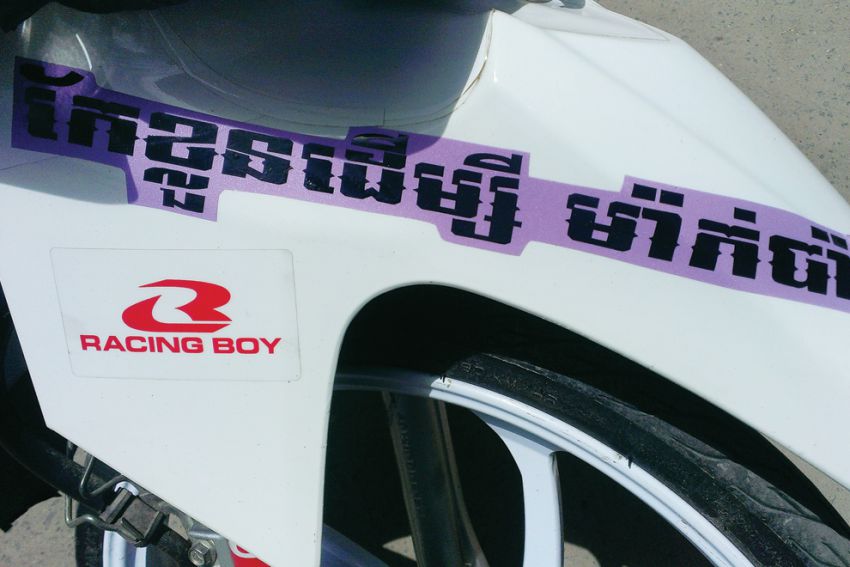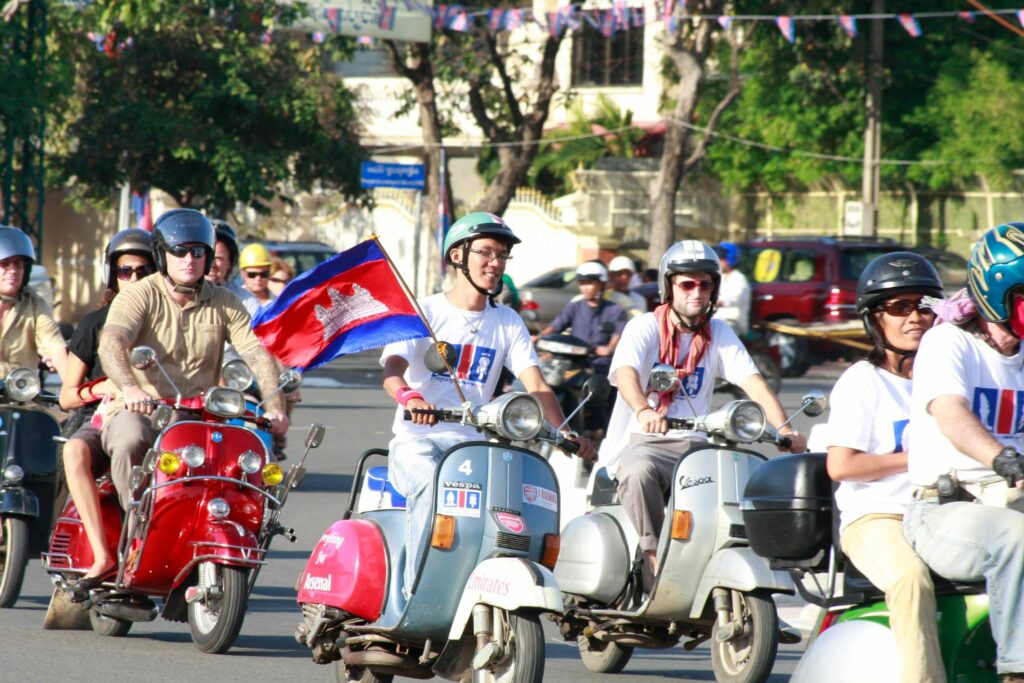Unofficial Translation from The Phnom Penh Post’s Khmer edition
TUESDAY, 25 AUGUST 2015,
TONG SOPRACH
ក្រសួងយុវជនមិនបានដោះស្រាយបញ្ហាយុវជនជាដុំកំភួនទេ

Because the Ministry of Education, Youths, and Sport is often referred to in shorthand as “The Ministry of Education”, it appears that the other two focuses, “youth” and “sports”, are neglected. While the sport sector seems to have improved due to the division of control and management among the sport field federations and the existence of the National Olympic Committee (responsible for organizing national and international sport events), the dramatically expanding issues affecting youths have not had sufficient contributors or financial donations, nor have they had received much attention from the Ministry of Education, Youth and Sports. Therefore, this poses the question of whether a separated “Ministry of Youth” should be created to deal with young people’s development and problems?
Youth-related problems are expanding so rapidly that the ministry appears unable to cope with them, despite the fact that they are divided in term of control and responsibility between the Ministry of Education, Youth, and Sports and the Ministry of Social Affairs in its youth rehabilitation department. On the website of the Ministry of Education, Youth, and Sports, it is not surprising to see the abundance of education-related activities, yet there are so few youth-related ones. In the Ministry, there are only two departments mandated to work with youth: the Department of Youth and the Department of Centre Management.
The only action to benefit youth is the provision of the opportunity to young people to obtain a scholarship to study abroad and participate in exchange programmes and short courses sponsored by the other countries, especially ASEAN members and its partners. In the Boy Scouts (Kayarith), ironically, the leading roles, which are supposed to belong to young people, are played by the aging senior government officials. A similar thing also occurs in the Cambodian National Youth Councils, where only small roles are given to youth.
How can young people develop if old people do not give them any opportunities to take part in leadership positions? And, if the senior government officers do attempt to provide youths with empowerment opportunities, these are almost exclusively reserved for their own children, a clear sign of nepotism.
Meanwhile, some people have founded associations and federations that work to promote youth, although it means they have to organize a protest or demonstration – for example, that of Mr. Soth Dyna, Cambodia’s current ambassador of the Republic of Korea (South Korea). However, when these people receive high positions or achieve their goals, it seems they inevitably lose their commitment and end up paying little heed to youth issues. All they are then keen on is maintaining their place and privileges.
Moreover, according to the 2008 census, the people who are between 15 and 30 years old of age make up 33 percent of the whole population, and most of these have the right to vote. That is, many politicians have been attempting and competing to exploit the youth for political benefits.
Occasionally, the ruling party (CPP) criticizes some youth associations, which support the opposition parties, for being anti-government. In response, the opposition party (CNRP) has attacked the government for standing behind the government-backed youth association/NGO/federation and using them for political purposes.
Although the law states that civil society cannot participate in the politics, politicians are still attempting to gain the support of the youth. Sometimes, it is themselves who are the leaders of youth associations. For example, Mr. Hun Many [PM Hun Sen’s son], CPP parliamentarian, is the President of Union of Youth Federation of Cambodia (UYFC) while its branch in Phnom Penh is led by the Mr. Say Samal [The Senate President Say Chhum’s son], the Minister of Environment, and the branch in Prey Veng by Mr. Sor Sokha [Deputy-PM Sor Kheng’s son], CPP parliamentarian as well.
Yet, the problems faced by today’s young people are still not effectively dealt with. These problems include unemployment, emigration, gang violence, gambling, drug abuses, alcoholism, robbery, gang rape (Bauk), lack of recreation and sport sites and so on. On the news, you will hear about these problems happening all over the country.
According to the research report on youth concerns in 2015 by Youth Coalition for Unity and Development (YCUD, 2015), which was submitted to the Ministry of Education, Youth, and Sports, 49 percent of Cambodian youth have raised unemployment as their main concern. How about the large number of students who failed their Bac II Examination? What should they do for a living? Does the ministry have any strategy or policy, which could assist them?
Obviously, the lack of labor market and the low incomes have pushed young people in the country to come from rural areas or emigrate to the cities and to abroad; both legal and illegal migrations for job opportunities, which make them vulnerable to dangers and sexual exploitation. Most of them have to do it although they have to be away from their families, or they will starve.
Furthermore, in the website of the National Police, we see the combative actions against drug users, most of whom are young men and women, and drug dealers. Today, there are a lot of young drug users in all parts of the country, even among the indigenous minority people. In simple words, drugs are seemingly on their way towards becoming part of everyday life for Cambodia’s young people. Based on the report of the Ministry of Interior, drug-related cases have increased by 150 percent in the past six months, compared to the same period in the previous year.
In some cases, tones of drugs were discovered, and the dealers are from many countries. Surprisingly, the transactions even take place in prison. In that way, the prison, so to speak, is not big enough for those drug evils. In the meantime, the money to be spent on those prisoners will be a burden for the government.
So what will the future of our youth turn out to be? What can they do to build this small country? How they protect their motherland if they are longing for drugs, which will gradually destroy themselves? What should the government do to get rid of those evils?
Drug abuse, alcohol, and gambling have been the main factors plaguing youth, getting them involved in crimes such as theft, robbery, and violence. Along the street, in the public, you will see these happen every day. Young people harming or even killing one another, showing no sympathy or remorse.
Many evil gangsters commit gang rape, with the majority of the victim are the women working in entertainment services. Often, gang rape can turn into murder. For example, In July, a woman was brutally raped and killed, and her body was left naked somewhere near Ang Ta Minh Pagoda, located in Por Senchey District of Phnom Penh.
Since the sites where young people can meet and play sports are almost all sold out to private investors, they have increased chances of getting involving in the types of crimes mentioned above.
The government, particularly the Ministry of Education, Youth, and Sports, seems unable to cope with these youth-related problems, nor can it respond to the National Policy for Youth Development. Considering the size of the problems, another institution, the Ministry of Youth and Youth Rehabilitation should be created, one separate from the Ministry of Education, Youth and Sports and the Ministry of Social Affairs, Veteran and Youth Rehabilitation.
Such action will indicate a real focus on youth development, not the meaningless promises only found on paper or heard from the mouths of the “deceiving politicians”, whose actions are completely different from such words but would say anything to gain support.
Nevertheless, there has been some progress in rehabilitation of drug-addicted young people in the Police Military Center in Bantey Meanchey province. Some have been doing their best in changing and improving themselves. However, I once saw a message on a young man’s motorbike license plate, which said “Kea Kluon Deumbei Mak Pa!” “I will change myself for my parents!”
Tong Soprach is a social-affairs columnist for the Post’s Khmer edition.
Comments: [email protected]
